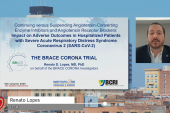ACE Inhibitors, ARBs: Still No Link to COVID-19 Risks, New Analyses Show
Researchers note that there are a number of randomized trials ongoing, but to date, the evidence supports benefit, not harm.

(UPDATED) Another observational study, in the form of a large analysis of US patients with hypertension, indicates that ACE inhibitors and ARBs are not associated with an increased risk of COVID-19 infection compared with use of other antihypertensive medications.
The study, appearing online December 14, 2020, ahead of print in the Journal of the American Heart Association (JAHA), was swiftly followed by the largest meta-analysis to date—this one published Friday in the European Heart Journal: Cardiovascular Pharmacotherapy (EHJ:CP)—also showing that ACE inhibitors/ARBs are safe and “should be continued” in patients with SARS-CoV-2.
Both papers join a series of epidemiologic studies published in the last few months quelling the concerns raised earlier in the pandemic about the use of ACE inhibitors and ARBs in infected patients.
“We were planning, if we had identified some harm due to these medications, to quickly convert [patients] to other drugs, other than ACE inhibitors or ARBs,” said Jaejin An, PhD (Kaiser Permanente Southern California, Pasadena), who led the JAHA study. “That was our original plan. Luckily, we didn’t find any harm, so it’s kind of a relief.”

In the early spring of 2020, there had been some fear about use of ACE inhibitors and ARBs because SARS-CoV-2, the virus that causes the disease, interacts with the renin-angiotensin-aldosterone system (RAAS) by binding to ACE2, an enzyme expressed in the lungs and other tissues. The theoretical concern was that ACE inhibitors and ARBs would increase the expression of ACE2 in the respiratory tract, which might heighten the risk of becoming infected or lead to a higher risk of complications among infected patients. The initial concerns led the major heart societies to recommend physicians not preemptively halt treatment in patients receiving the drugs, but they did call for randomized trials.
Lower Virus Risk Seen in Elderly on ACE Inhibitors
For the JAHA study, 824,650 patients with hypertension treated at Kaiser Permanente Southern California, a large US integrated healthcare system, were included. Of these patients, 16,898 were tested for COVID-19; 1,794 (10.6%) tested positive. Among those with hypertension who underwent COVID-19 testing, 28.9% were taking ACE inhibitors, 20.6% were on ARBs, and 24.7% were taking a calcium channel blocker, beta-blocker, or thiazide diuretic.
In a propensity-matched analysis, exposure to ACE inhibitors was not associated with an increased risk of COVID-19 infection when compared with individuals taking a calcium channel blocker, beta-blocker, or thiazide diuretic (OR 1.06; 95% CI 0.90-1.25). Similarly, taking an ARB was not linked with a higher rate of infection compared with taking other hypertensive medications (OR 1.10; 95% CI 0.91-1.31).
Interestingly, the association between RAAS inhibitor use and COVID-19 infection varied in patients of different ages (P for interaction = 0.03), with adults older than age 85 years who were on ACE inhibitors, but not ARBs, having a lower risk of COVID-19 infection compared with use of other antihypertensive medications (OR 0.30; 95% CI 0.12-0.77).
“Our study is a retrospective, observational study, so we want to always be cautious interpreting these data,” said An, referring to the protective effect of ACE inhibitors in older adults. Unmeasured confounding, or inflated type I error due to multiple testing, is a possibility, say the researchers. Still, “it’s an interesting finding,” An said, adding there are ongoing clinical trials in older individuals with cardiovascular disease to determine if ACE inhibitors or ARBs can prevent severe outcomes from COVID-19.
They also observed an increased likelihood of COVID-19 infection among hypertensive patients not taking any antihypertensive medication compared with those treated with a calcium channel blocker, beta-blocker, or thiazide diuretic. Again, the researchers urge caution with their findings due to the potential for unmeasured confounding. Given their nonadherence to treatment, these patients might also have poorer health behaviors and/or more adverse social determinants of health putting them at risk for COVID-19 infection, said An. Higher blood pressures also could factor into being more susceptible to infection.
“We’re not sure why we’re seeing this, but we wanted to point out that this group [not taking antihypertensive medication] is at higher risk,” An said. “We want to explore this further.”
One of the strengths of the new analysis is that it includes a racially and ethnically diverse patient population, said An. In total, 12% of patients taking ACE inhibitors were Black, as were 14% of those taking ARBs. Roughly one-third of patients taking either drug class were Hispanic. One in five patients taking an ARB were Asian. There was also a broad socioeconomic mix (based on neighborhood income) and insurance type.
Mega Meta-analysis
In the EHJ:CP paper, Matthew M.Y. Lee, MBChB (British Heart Foundation Cardiovascular Research Centre, University of Glasgow, Scotland), and colleagues combined 86 studies published between May 2 and August 12, 2020, addressing the use of ACE inhibitors, ARBs, or both in the setting of COVID-19. Out of a total of 459,755 patients, 103,317 had hypertension. The researchers concluded that use of the agents was not associated with a greater chance of hospitalization, death, intensive care, ventilation, or a combined endpoint of ventilation/intensive care/death.
“Our meta-analysis provides reassurance for physicians and patients that each of ACE inhibitors and ARBs are safe in the context of SARS-CoV-2 infection and should not be discontinued,” Lee et al conclude.
In an email to TCTMD, co-author Ankur Kalra, MD (Cleveland Clinic, OH), stressed that the study represents the “largest aggregate data to date” addressing the use of renin-angiotensin-aldosterone system blockers in this setting. “We’ve comprehensively demonstrated that ACE inhibitors or ARBs were not associated with either the likelihood of SARS-CoV-2 positivity or with severity of COVID-19 illness,” he said. “Moreover, these findings were also true for patients with hypertension alone (more than 100,000 patients) [and] hypertension was shown to be one of the most common and important underlying disease conditions associated with COVID-19 infection.”
They further note that there are “many ongoing randomized studies” of these two drug classes in patients diagnosed with COVID-19, the first of which—BRACE CORONA—was released at the European Society of Cardiology Congress 2020, as reported by TCTMD. In BRACE CORONA, hospitalized patients with COVID-19 who continued on previously prescribed ACE inhibitors and ARBs were not at an increased risk of dying or remaining in the hospital compared with patients who stopped their RAAS inhibitors.
TCTMD Managing Editor Shelley Wood contributed to this article.
Michael O’Riordan is the Managing Editor for TCTMD. He completed his undergraduate degrees at Queen’s University in Kingston, ON, and…
Read Full BioSources
An J, Wei R, Zhou H, et al. Angiotensin-converting enzyme inhibitors or angiotensin receptor blockers use and COVID-19 infection among 824,650 patients with hypertension from a US integrated healthcare system. J Am Heart Assoc. 2020;Epub ahead of print.
Lee MMY, Docherty KF, Sattar N, et al. Renin-angiotensin system blockers, risk of SARS-CoV-2 infection and outcomes from COVID-19: systematic review and meta-analysis. Eur Heart J Cardiovasc Pharmacother. 2020;Epub ahead of print.
Disclosures
- An reports grants from Novartis, Vital Strategies/Resolve to Save Lives, and Merck.
- Lee reports no relevant conflicts of interest.





Comments